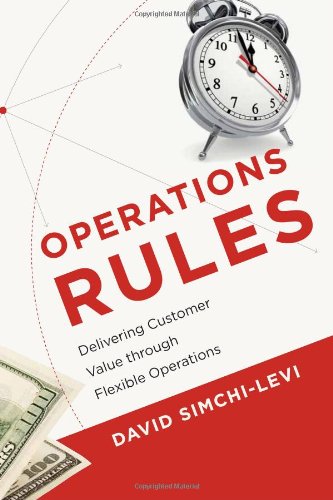In recent years, management gurus have urged businesses to adopt such strategies as just-in-time, lean manufacturing, offshoring, and frequent deliveries to retail outlets. But today, these much-touted strategies may be risky. Global financial turmoil, rising labor costs in developing countries, and huge volatility in the price of oil and other commodities can disrupt a company's entire supply chain and threaten its ability to compete. In Operations Rules, David Simchi-Levi identifies the crucial element in a company's success: the link between the value it provides its customers and its operations strategies. And he offers a set of scientifically and empirically based rules that management can follow to achieve a quantum leap in operations performance.
Flexibility, says Simchi-Levi, is the single most important capability that allows firms to innovate in their operations and supply chain strategies. A small investment in flexibility can achieve almost all the benefits of full flexibility. And successful companies do not all pursue the same strategies. Amazon and Wal-Mart, for example, are direct competitors but each focuses on a different market channel and provides a unique customer value proposition--Amazon, large selection and reliable fulfillment; Wal-Mart, low prices--that directly aligns with its operations strategy. Simchi-Levi's rules--regarding such issues as channels, price, product characteristics, value-added service, procurement strategy, and information technology--transform operations and supply chain management from an undertaking based on gut feeling and anecdotes to a science.
"From managing risk by focusing on flexibility to choosing the right IT investments, this book can help companies navigate today's supply chain challenges and achieve a quantum leap in operations performance." Hasso Plattner, Co-Founder of SAP and Chairman of the SAP Supervisory Board
"Companies today are faced with an increasing number of choices in operational and supply chain strategies. This book goes beyond just showing how to make the right operational decisions. It makes the critical link between operations and providing more value to customers. It's a must read for anyone involved in operations and strategy." Jim Champy, Coauthor of Reengineering the Corporation
"This well written book provides guidelines that can help managers address today's business challenges such as risk and market volatility. We have already implemented many of the ideas and concepts in our operations and supply chain practice and the payoffs have been significant." Narendra Mulani, Managing Director , Accenture LLP
"This book provides a broad range of important concepts in operations and supply chain management that are practical and useful both for management and for practitioners. Having implemented some of the ideas in this book, my team at Pepsi Beverages Company achieved remarkable results in a short amount of time with a small financial investment." Paul Hamilton, VP Supply Chain Strategy & Logistics, Pepsi Beverages Company
"David Simchi-Levi musters a set of powerful arguments for matching operating strategy to the demands of a particular product or market, this in an era when one-size-fits-all often leads to disaster. Along the way he offers a lesson- and example-rich tour of some of the best current thinking on supply chain management, making the case for why operations is critical to overall corporate strategy." Walter Kiechel III, Author, The Lords of Strategy
"Our team has found the concepts in the book highly applicable to our supply chain and operations strategy as well as to the issues we experience. In particular, the innovative approach to flexibility has triggered interesting discussion in our organization. This book will definitely help organizations to strengthen their operations strategy." John J. Grimaldi, Former President, Michelin North America, Inc.
![]()
